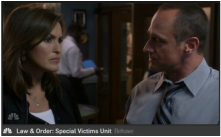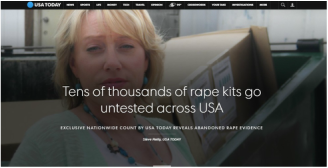I used to watch Law and Order: Special Victims Unit ALL THE TIME. There was something about these fictional heroes fighting on behalf of victims of sexual violence that felt so satisfying. Even when they weren’t successful at putting all the perpetrators behind bars, Benson and Stabler made me feel like I wasn’t alone in the movement to end gender violence. Though the subject material was tough, I loved the show. I watched religiously until I began working as a crisis counselor full-time. It just got too real and too tough to tune into SVU regularly after assisting folks with so many horrible situations all day at work.
I also learned, through years of assisting folks over hotlines and in hospital rooms, that the world of SVU does not accurately reflect how stuff usually goes down in the real world after someone has been sexually assaulted. The detectives often make promises they cannot keep (“If you tell me who he is he will never hurt you again”), use unorthodox (though creative) methods for dramatic effect, and misrepresent how procedures like interviews actually happen and how long processes like crime lab testing realistically take (contrary to what SVU suggests, this can take years).
The show also brings awareness to many important issues, like the episode, “Behave,” that integrated the very real problem of the backlog of unprocessed forensic evidence collection kits. It’s a huge national problem that needs more attention, especially since untested kits mean serial perpetrators may not be identified and prosecuted. It’s one more way in which our country fails to put forth the effort and financial backing to respond to the problem of sexual violence appropriately.
How we’re talking about this issue, however, is problematic for a few reasons. If you watch SVU, you’ve heard the detectives and attorneys repeatedly refer to forensic evidence collection kits as “rape kits” and that language is now commonplace for reporters, nurses, and even victim advocates. This language has made me flinch for years, and here’s why.
Second, this shorthand language is a casual, terse, and insensitive description of what occurs during forensic evidence collection. Yes, the process can be invasive, uncomfortable, and incredibly long (I have witnessed some that last four hours or more)—but using the word rape to describe the process can make it seem flip and sound incredibly scary to someone trying to decide whether or not to have one completed. Yes, if the nurse who completes it does not have the appropriate training or is insensitive to a victim throughout the process, forensic evidence collection may be traumatizing to a victim. But the collection in and of itself should not be described using the term of the crime it intends to document.
Third, this language can be a deterrent to folks deciding to proceed with evidence collection. Much of this issue has to do with how someone names or perceives the experience that brought them to the hospital in the first place. A person may or may not identify the incident as rape, so asking if they would like to have a rape kit completed is counterintuitive. As an advocate, it’s incredibly important to me that someone not have their experienced named for them—so using this language not only risks taking away that choice, but also makes the evidence collection seem like something that it’s not. It also calls forth all those pesky stereotypes many people have about rape—that it is only committed by men toward women and that it must involve physical force—suggesting that the kit is only for heterosexual women with visible or “obvious” injuries. Naming the evidence collection by its function, though it sounds more sterile and neutral, is a better idea because it is for everyone, no matter what has occurred. Nurses can collect saliva as evidence from a man’s cheek or arm, for example; forensic evidence collection may or may not involve any more than that.
Yes, I know I am being nit-picky. I worry that when we borrow the language that pop culture provides, at least in this instance, we risk that language constructing a reality that is much less human, much less compassionate. The detectives and attorneys on SVU exist in a completely different dimension, and as characters, there are no real ramifications for their casual work jargon. But in our world, we may deter folks from having evidence collected by using slang language to describe it that is not accurate. Everyone has a choice whether or not to undergo evidence collection after an assault, but if we hope to provide the most accurate, objective information about that choice, we need to stop calling it what it’s not. I am not suggesting that anyone who uses the phrase “rape kit” is being flip about sexual violence, but I am concerned at the kinds of messages this language may send when it gets used so often in mainstream discourse as well as in hospital rooms and crisis centers across the country. It may make an eye-catching headline, but it may also distance us from those affected most by sexual violence. So please: stop calling them rape kits.
--
Big thanks to Megan Jones-Williams for her contributions to this piece. We’ve been discussing this issue for years, and I am thankful for her wisdom on the subject.





 RSS Feed
RSS Feed